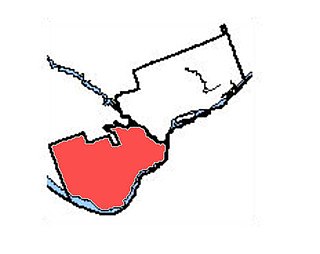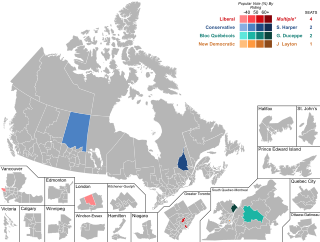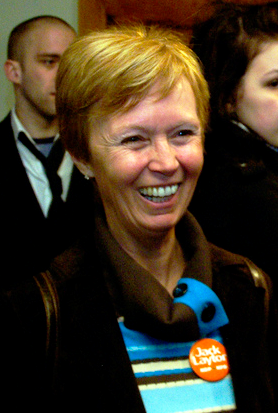Related Research Articles

The British Columbia Social Credit Party was a conservative political party in British Columbia, Canada. It was the governing party of British Columbia for all but three years between the 1952 provincial election and the 1991 election. For four decades, the party dominated the British Columbian political scene, with the only break occurring between the 1972 and 1975 elections when the British Columbia New Democratic Party governed. Party member were known as Socreds.
The Canadian social credit movement is a political movement originally based on the Social Credit theory of Major C. H. Douglas. Its supporters were colloquially known as Socreds in English and créditistes in French. It gained popularity and its own political party in the 1930s, as a result of the Great Depression.

The Christian Heritage Party of Canada, also referred to as CHP Canada, is a minor social conservative and Christian right federal political party in Canada; it was founded in 1987, the brainchild of two couples in British Columbia, namely Bill and Heather Stilwell who were Roman Catholics and Ed Vanwoudenberg and his wife, Reformed Protestants. CHP advocates for Canada to be governed according to Christian principles and ethics. The party's stated principle is that "the purpose of civil government is to ensure security, freedom, and justice for all its citizens from conception till natural death, by upholding just laws". CHP states that, if the party forms government, it hopes to "apply proven Judeo-Christian principles of justice and compassion to Canada's contemporary public policy needs".

The Social Credit Party of Canada, colloquially known as the Socreds, was a populist political party in Canada that promoted social credit theories of monetary reform. It was the federal wing of the Canadian social credit movement.
The Libertarian Party of Canada is a federal political party in Canada founded in 1973. The party subscribes to libertarian and classical liberal tenets; its stated mission is to reduce the size, scope, and cost of government. Party policies include ending drug prohibition, ending government censorship, lowering taxes, protecting gun rights, ending laws criminalising the voluntary transfer of money for sex acts between consenting adults, and non-interventionism.
Unity, United Progressive Movement and United Reform were the names used in Canada by a popular front party initiated by the Communist Party of Canada in the late 1930s.

John C. Turmel is a perennial candidate for election in Canada, and according to the Guinness World Records holds the records for the most elections contested and for the most elections lost, having contested 112 elections and lost 111. The other contest was a by-election that was pre-empted by a general election call.

Kenneth Livingstone Campbell was a Canadian fundamentalist Baptist evangelist and political figure. He was the final leader of the Social Credit Party of Canada from 1990 to 1993.
The Social Credit Party of Ontario (SCPO) was a minor political party at the provincial level in the Canadian province of Ontario from the 1940s to the early 1970s. The party never won any seats in the Legislative Assembly of Ontario. It was affiliated with the Social Credit Party of Canada and espoused social credit theories of monetary reform.
John Ross Taylor was a Canadian fascist political activist and party leader prominent in white nationalist circles.
The Freedom Party of Ontario is a political party in Ontario, Canada.

Hull—Aylmer is a federal electoral district in Quebec, Canada, that has been represented in the House of Commons of Canada since 1917.
Conservatism in Canada is generally considered a movement which is primarily represented by the modern-day Conservative Party of Canada in federal party politics, as well as various centre-right and right-wing parties at the provincial level. Far-right politics have never been a prominent force in Canadian society. The first party which called itself "Conservative" in what would become Canada was elected in the Province of Canada election of 1854.

Anne McGrath is a Canadian politician and political advisor. McGrath was president of the New Democratic Party from 2006 to 2009, National Director of the NDP from 2019 to 2024 and previously from 2014 to 2015, principal secretary to former Alberta Premier Rachel Notley, and as Notley's deputy chief of staff. McGrath is currently serving as the principal secretary to federal NDP leader Jagmeet Singh in the House of Commons.
The New Democratic Party is a federal political party in Canada. Widely described as social democratic, the party sits at the centre-left to left-wing of the Canadian political spectrum, with the party generally sitting to the left of the Liberal Party. The party was founded in 1961 by the Co-operative Commonwealth Federation (CCF) and the Canadian Labour Congress (CLC).
John H. Long is a Canadian political figure. He has sought election to the House of Commons of Canada and the Legislative Assembly of Ontario on five occasions and has run for the leadership of the Social Credit Party of Canada, the Progressive Conservative Party of Canada, and the Canadian Alliance. He is strongly influenced by social credit economic theories and has often called for reform of the Bank of Canada.

By-elections to the 39th Canadian Parliament were held to fill vacancies in the House of Commons of Canada between the 2006 federal election and the 2008 federal election. The Conservative Party of Canada led a minority government for the entirety of the 39th Canadian Parliament, although their seat total increased as a result of by-election results.

Nycole Turmel is a Canadian politician who served as the member of Parliament (MP) for Hull—Aylmer from 2011 to 2015. A member of the New Democratic Party (NDP), Turmel served as the party's interim leader from 2011 to 2012.
The Pauper Party of Ontario is a former libertarian-populist political party in the Canadian province of Ontario based on the principles of social credit. Registered in 2011, the party was led by perennial candidate John Turmel.
References
- ↑ "Meet the candidate: Independent John Turmel has run (and lost) in nearly 100 byelections". BradfordToday.ca. Retrieved 2023-03-23.
- ↑ Canada, Elections (2018-08-27). "Official Reports". www.elections.ca. Retrieved 2023-03-23.